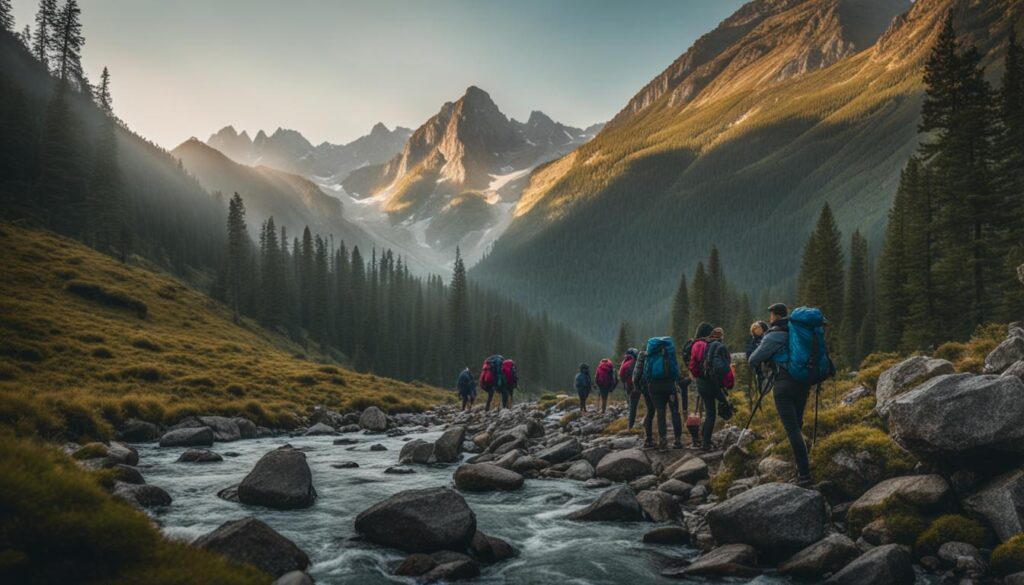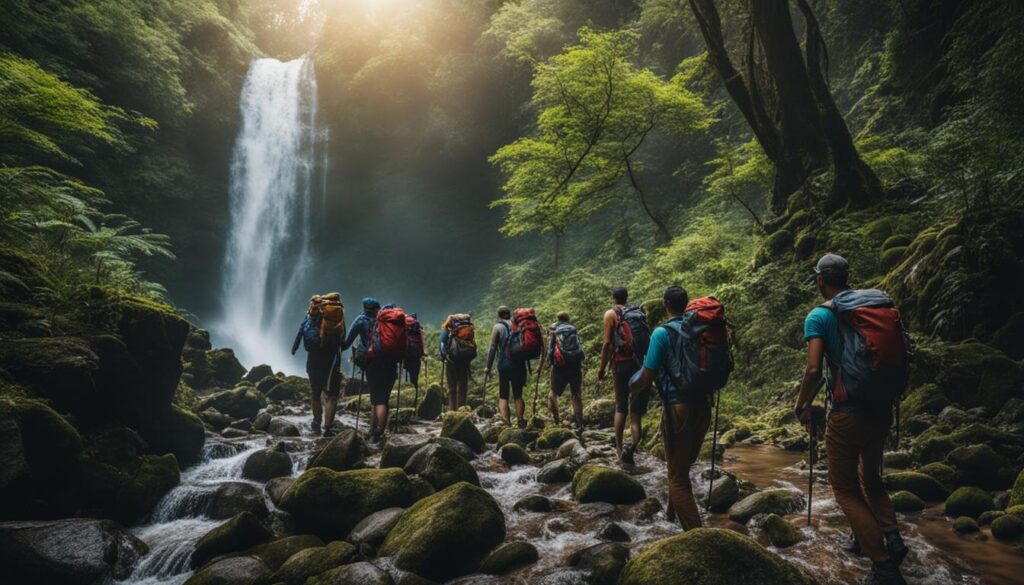When it comes to wilderness adventures, it’s important to remember the principles of Leave No Trace ethics. These guidelines help us enjoy outdoor activities while minimizing our impact on the environment. From backcountry travel to sustainable camping, incorporating these outdoor ethics into our adventures allows for responsible wilderness exploration. By being mindful of our actions, we can ensure the preservation of our natural landscapes for future generations.
Key Takeaways:
- By following Leave No Trace ethics, we can minimize our environmental impact during wilderness adventures.
- Planning ahead and preparing for trips helps us gather information and be aware of regulations and potential hazards.
- Traveling and camping on durable surfaces protects the natural landscape.
- Proper waste disposal, including packing out trash and following guidelines for human waste, is crucial for outdoor conservation.
- Respecting wildlife and other visitors enhances the overall experience for everyone.
The Seven Principles of Leave No Trace

The Leave No Trace ethics provide a framework of principles that can guide individuals in minimizing their environmental impact while enjoying wilderness adventures. These principles are continuously evaluated and updated to ensure they align with the latest insights from experts in outdoor education.
Principle 1: Plan Ahead and Prepare
This principle emphasizes the importance of gathering information, knowing regulations, and being prepared for potential hazards and emergencies. By planning ahead and preparing, individuals can make responsible choices regarding group size, waste management, and other factors that can impact the environment.
Principle 2: Travel and Camp on Durable Surfaces
Staying on designated trails and campsites protects the natural landscape from unnecessary damage. This principle encourages individuals to choose durable surfaces and camp at least 200 feet away from water bodies to preserve fragile ecosystems.
Principle 3: Dispose of Waste Properly
Proper waste disposal is crucial for maintaining the cleanliness and integrity of wilderness areas. Leave No Trace promotes packing out all trash, disposing of human waste following guidelines, using biodegradable soap, and scattering strained dishwater to minimize environmental impact.
Principle 4: Leave What You Find
Preserving natural objects and avoiding the introduction of non-native species are essential for maintaining the ecological balance of wilderness areas. This principle encourages individuals to appreciate and protect natural features without building structures, digging trenches, or disturbing the environment.
Principle 5: Minimize Campfire Impacts
In order to minimize the impact of campfires, lightweight stoves are recommended as an alternative. When fires are permitted, they should be kept small and all wood and coals should be completely extinguished to prevent forest fires and preserve the natural landscape.
Principle 6: Respect Wildlife
Observing wildlife from a distance and avoiding feeding or approaching them is crucial for wildlife conservation and safety. This principle also promotes responsible control of pets and avoiding wildlife during sensitive times, such as nesting or mating seasons.
Principle 7: Be Considerate of Other Visitors
Respecting other visitors and maintaining the quality of their experience is an important aspect of Leave No Trace ethics. This principle encourages yielding on trails, camping away from trails and other visitors, and minimizing noise levels to preserve the peacefulness and serenity of wilderness areas.
By following these seven principles, individuals can make a positive impact on the environment and ensure the preservation of wilderness areas for future generations.
| Principle | Description |
|---|---|
| 1. Plan Ahead and Prepare | Gather information, know regulations, and be prepared for hazards and emergencies. |
| 2. Travel and Camp on Durable Surfaces | Stay on designated trails and campsites to protect the natural landscape. |
| 3. Dispose of Waste Properly | Pack out all trash, properly dispose of human waste, use biodegradable soap, and scatter strained dishwater. |
| 4. Leave What You Find | Preserve natural objects, avoid introducing non-native species, and refrain from building structures. |
| 5. Minimize Campfire Impacts | Minimize campfire impacts by using lightweight stoves and ensuring proper fire extinguishment. |
| 6. Respect Wildlife | Observe wildlife from a distance, avoid feeding them, and control pets responsibly. |
| 7. Be Considerate of Other Visitors | Respect other visitors and minimize noise levels to maintain a high-quality experience. |
Incorporating Leave No Trace into Your Wilderness Adventures

When I embark on wilderness adventures, I always strive to incorporate Leave No Trace ethics into my outdoor activities. By following the seven principles established by the Leave No Trace Center for Outdoor Ethics, I can minimize my environmental impact and contribute to the responsible exploration of wilderness areas.
One practical tip for incorporating Leave No Trace ethics is to research and plan my trip beforehand. This allows me to understand the regulations and special concerns for the area I’ll be visiting. By being knowledgeable about the rules and guidelines, I can make informed decisions that align with sustainable camping and eco-friendly outdoor activities.
Another aspect of Leave No Trace ethics is packing lightweight and sustainable camping gear. This not only reduces waste but also minimizes the environmental impact of my outdoor adventures. By investing in durable and eco-conscious hiking equipment, I can enjoy wilderness exploration while minimizing the footprint I leave behind.
In addition to these measures, it’s important to be mindful of where I camp and choose durable surfaces to minimize damage to the natural landscape. By camping on designated surfaces and staying at least 200 feet away from water bodies, I can ensure the preservation of these pristine environments for future generations.
| Principle | Key Points |
|---|---|
| Plan Ahead and Prepare | Gather information, know regulations, practice responsible group size and waste management |
| Travel and Camp on Durable Surfaces | Stay on designated trails and campsites, camp at least 200 feet away from water bodies |
| Dispose of Waste Properly | Pack out all trash, follow guidelines for human waste disposal, use biodegradable soap |
| Leave What You Find | Preserve natural objects, avoid introducing non-native species, refrain from building structures or digging trenches |
Respecting wildlife is another crucial aspect of Leave No Trace ethics. Observing wildlife from a distance and refraining from feeding or approaching them ensures their well-being and preserves the natural balance of ecosystems. Additionally, being considerate of other visitors by practicing good trail etiquette and minimizing noise levels contributes to a positive and enjoyable outdoor experience for everyone.
By incorporating Leave No Trace ethics into my wilderness adventures, I can enjoy responsible and sustainable outdoor exploration while minimizing my environmental impact. It’s up to all of us to preserve the beauty and integrity of these natural spaces for future generations.
Enjoying Responsible Wilderness Exploration
When it comes to wilderness adventures, it’s not just about the thrill of exploration; it’s also about being responsible stewards of the environment. By embracing Leave No Trace ethics, we can ensure that our outdoor activities have a minimal impact on the wilderness we love to explore.
Being mindful of outdoor ethics starts with understanding the principles of Leave No Trace. These principles provide valuable guidelines for minimizing our environmental impact. Whether we’re hiking, camping, or engaging in any other eco-friendly outdoor activities, following these principles is crucial.
One of the key principles is to practice sustainable camping. This means using durable surfaces for camping and leaving natural objects untouched. It also involves disposing of waste properly, including packing out all trash and following guidelines for human waste disposal. By doing so, we can preserve the natural beauty of the wilderness and keep it pristine for future generations.
Respecting wildlife is another important part of responsible wilderness exploration. It’s essential to observe wildlife from a distance, avoiding any unnecessary disturbance. Feeding wildlife or approaching them can disrupt their natural behavior and harm their well-being. Let’s remember that we are guests in their home and act accordingly.

